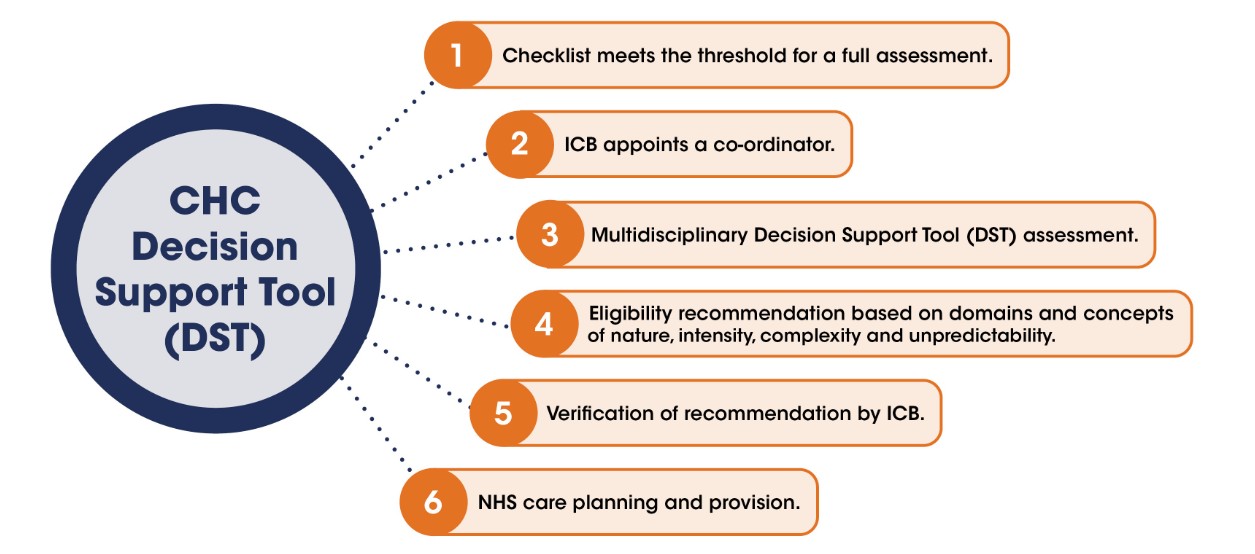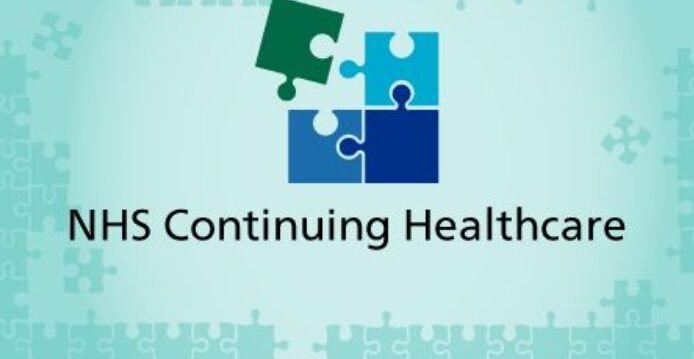Unlocking CHC Funding: What Are the 4 Criteria for Eligibility?
Last Updated on
What Does CHC Funding Mean and Why Is It Crucial?
The promise of free, comprehensive care
NHS Continuing Healthcare (CHC) is a non–non-means-tested NHS entitlement providing free, round-the-clock care—nursing, therapy, and personal support—for adults whose primary need stems from a health condition, disability, or accident. Unlike social care, which can incur hefty fees, CHC covers:
- Specialist nursing provided through tailored home care services.
- Care home placements, both residential and nursing
- Hospice or palliative care, when end-of-life support is required
By securing CHC, families avoid potentially six-figure bills for private care, while the NHS can reduce costly hospital readmissions—estimated savings of £60,000–£70,000 per patient per year.
How Does CHC Funding Work in Practice?
From referral to care plan
The CHC journey unfolds through a series of steps, each demanding attention to detail:
- Referral: Made by a GP, hospitalteamm or care provider when someone’s needs appear health-driven.
- Residency Check: Confirms “ordinary residence” in England before clinical assessment.
- Checklist Screening: A brief screening tool gauges whether a full assessment is warranted.
- Decision Support Tool (DST): A multidisciplinary team scores care needs across 12 domains.
- Integrated Care Board (ICB) Decision: Formal approval or refusal within 28 days (or 48 hours for end-of-life fast-track).
- Care Package Activation: CHC-funded support begins immediately upon approval.
Keep a calendar of target dates and gather supporting evidence—care notes, incident records and professional reports—to streamline each stage.
What are the 4 criteria for CHC funding?
Your definitive eligibility checklist
At the heart of every application lie four sequential criteria. Only by meeting each can fully NHS-funded care be secured:
- Ordinary Residence in England
- Primary Health Need
- Decision Support Tool (DST) Assessment
- Integrated Care Board (ICB) Final Decision
At the core of every successful CHC application are four sequential gates. You must satisfy each in full before the NHS commits to a Continuing Healthcare package. Below, we deepen the explanation of each criterion, complete with practical examples, common pitfalls, and tips to strengthen your case.
1. Ordinary Residence in England
Residency demystified

What it means: You must habitually live in England, under lawful status, to remain.
-
Habitual Presence: Demonstrate that England is your permanent home—evidence might include a year’s worth of utility bills, council tax statements, or a signed tenancy agreement.
-
Settled Intention: Temporary visa holders on short placements (e.g., 6-month work visas) often fall short. If you’ve moved permanently—say, returning from overseas—you’ll need proof of long-term commitments: GP registration, school enrolment for children, or mortgage contracts.
-
Common Pitfalls:
-
Relying on a single document (e.g., a bank statement) rather than a portfolio of proof.
-
Applying immediately after moving; delay until key registrations (GP, electoral roll) are confirmed.
-
Tip: Compile at least three different residency documents spanning three consecutive months to avoid delays.
2. Primary Health Need
Why clinical needs must dominate
What it means: Your care package must be driven predominantly by a health condition, rather than social or domestic requirements.
-
Substantial: You require regular, hands-on clinical interventions, such as wound dressings, syringe-driver medication, or catheter changes, that unqualified carers cannot safely perform.
-
Ongoing: Needs arise consistently (daily or weekly). Occasional therapy or one-off procedures do not qualify.
-
Complex: Multiple interdependent issues. For example, a Parkinson’s patient with choking risks, pressure sores, mood disturbances, and mobility challenges. Each domain amplifies the others.
-
Unpredictable: Your condition can deteriorate or spike without warning, such as sudden respiratory distress in COPD patients, requiring rapid nurse-led intervention.
Example: A post-stroke individual who needs daily physiotherapy, speech therapy, nutritional monitoring, and pain management clearly meets all four descriptors.
3. Decision Support Tool (DST) Assessment
Decoding the multidisciplinary review

What it means: A structured, 12-domain scoring process led by a multidisciplinary team.
-
Who’s Involved: Specialist nurses, therapists (physio, occupational, speech), social workers, and medical staff collaborate.
-
12 Domains: Mobility, behaviour, cognition, nutrition, continence, skin integrity, breathing, drug administration, and more.
-
Scoring Scale: Each domain is rated Low, Moderate, High, Severe, or Exceptional.
-
High to Exceptional in a single domain often signals eligibility; multiple Moderate or a blend of Moderate and High can also qualify.
-
-
Report & Recommendation: The team produces a written DST report with a clear “Eligible” or “Not Eligible” recommendation.
Common Challenges:
-
Incomplete evidence—care staff should maintain daily logs for each domain.
-
Misunderstanding domain definitions—ask the assessor to clarify if a rating seems off.
Tip: Invite your regular care provider to the DST meeting; their firsthand testimony can tip marginal domains into the “High” bracket.
4. Integrated Care Board (ICB) Decision & Your Rights
From DST to final outcome
What it means: The ICB (formerly the CCG) reviews the DST report and issues a binding decision.
-
Standard Timescale: 28 calendar days from DST submission to formal decision.
-
Fast-Track Timescale: A 48-hour window is given to those with fast-declining health and limited life expectancy.
-
Outcomes:
-
Approved: CHC package begins immediately, with funding covering agreed services.
-
Refused: You receive written reasons. You can:
-
Request a local review within six months—cite specific DST domains you believe were underrated.
-
Lodge an NHS complaint if procedural errors occurred.
-
Escalate to the Parliamentary and Health Service Ombudsman for an independent investigation.
-
-
Practical Tip: As soon as you receive the ICB decision letter, draft your review grounds—highlighting DST discrepancies—and submit within the six-month window to preserve your appeal rights.
At-a-Glance: The 4 Eligibility Criteria
| Criterion | Core Requirement |
|---|---|
| 1. Ordinary Residence | Habitual, lawful, and settled presence in England. |
| 2. Primary Health Need | Substantial, ongoing, complex, and unpredictable clinical needs. |
| 3. DST Assessment | Multidisciplinary scoring across 12 domains with clear recommendations. |
| 4. ICB Decision & Rights | Formal decision in 28 days (fast-track in 48 hours); right to review or appeal. |
Practical Implications for Care Providers and Small Businesses

Leveraging CHC for sustainable services
For small care providers and nursing homes, CHC funding offers both security and complexity:
- Guaranteed Funding: NHS payments reduce financial risk—critical for smaller organisations.
- Service Development: Invest in staff training for complex and end-of-life care to align offerings with CHC needs.
- Administrative Rigor: Implement case-management software to track DST deadlines, referrals, and appeals.
Case Study: A Hampshire care home increased its CHC-funded occupancy from 20% to 50% by appointing a dedicated CHC liaison nurse and partnering with local ICB assessors.
By embedding “What are the 4 criteria for CHC funding?” within your application planning—and understanding each step from residency to final appeal—you can navigate the NHS system with confidence, secure vital support, and help small care businesses stabilise their funding streams. Share this guide with colleagues, clients, and care partners to ensure no one misses out on CHC funding they’re entitled to.
Frequently Asked Questions (Concise Two-Line Answers)
1. What paperwork do I need before referral?
Proof of English residence (e.g., utility bill or GP registration) plus recent clinical records (discharge summaries, care plans).
2. Who can refer someone to CHC?
Any healthcare professional (GP, hospital team, care home manager) or a family/legal deputy with valid consent or power of attorney.
3. How fast is the Fast-Track Pathway?
Decisions are made within 48 hours for those with rapidly deteriorating conditions, compared to up to 28 days on the standard route.
4. Can my CHC package change over time?
Yes—request an interim review whenever needs increase or decrease, and a new DST reassessment will adjust your support accordingly.
5. What if my application is refused?
First, request a local review within six months, then use the ICB’s NHS complaints process, and finally appeal to the Parliamentary and Health Service Ombudsman if needed.







